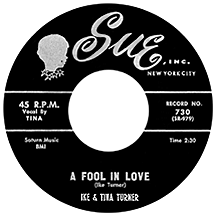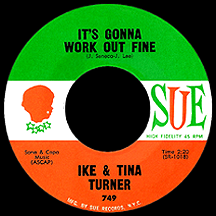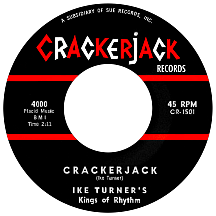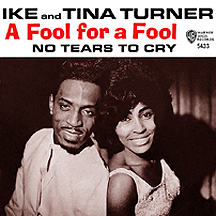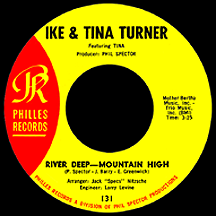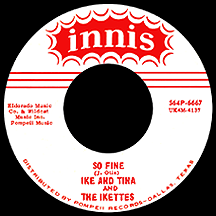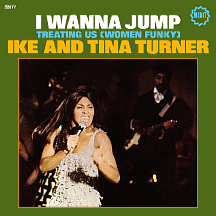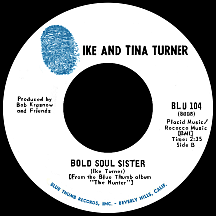IKE AND TINA TURNER
I love Tina Turner. I like Ike Turner too. I like them together very much...as a music act. Over a span of 16 years they created a body of work so compelling and irresistible, in recorded music and live stage shows, that it would make any personal struggles seem to be worth going through. At any rate, I prefer to focus on their musical accomplishments. Ike, a baptist minister's son, was born in Clarksdale, Mississippi in 1931 and by the age of eight was hanging out and doing odd jobs at local radio station WROX. Blues slide guitarist Robert Nighthawk often played live on the station in the following years and Ike sometimes helped set up equipment (Nighthawk later formed his own group, The Nighthawks, and in 1949 hit the R&B charts with "Annie Lee Blues"). He became one of Ike's early heroes, as did Mississippi-born Pinetop Perkins, who also played with Nighthawk and helped Ike learn to play piano in a bluesy, boogie woogie style. Ike put a band together in high school which, by 1949, had evolved into The Kings of Rhythm.
In 1950, Sam Phillips started the Memphis Recording Service, fair game to just about anyone who wanted to lay down a master tape with hopes of label distribution (it took a year or two for Phillips to figure out he could multiply his fortunes by releasing the best sessions on his own Sun label). Ike and his Kings were among Sam's earliest customers. With vocals by another Clarksdale native, saxophonist Jackie Brenston, Turner and the group recorded "Rocket '88'," a loud, in-your-face celebration of a popular new car, essentially a three minute commercial for Oldsmobile's latest model. With distorted guitar and untamed vocals and sax playing by Brenston, it was one of the most rocking records of its time. Phillips had made a deal with Chicago's Chess Records to give them first shot at any masters he felt had potential. He had a good ear for a hit - this striking Kings of Rhythm effort, credited to Jackie Brenston and his Delta Cats, reached number one on the rhythm and blues charts in June 1951.
Ike added guitar playing to his piano work, becoming proficient with his weapon of choice, the Fender Stratocaster. Playing on other musicians' recordings at the renamed Sun studios, he and the Kings of Rhythm also backed up a number of artists at live gigs in Memphis and later St. Louis. He even had a woman, Bonnie Mae Wilson, in the band for a few years, sometimes performing with her as Bonnie and Ike Turner. They released a single together, "Looking For My Baby" on RPM in 1952, and may have been married for a short time (Ike's total number of wives throughout the years is uncertain; even he gave contradicting accounts, sometimes claiming a dozen or more). He got on very well with The Bihari Brothers, owners of the Modern and RPM record labels in Los Angeles, taking an A&R position in addition to his recording contract, promoting the company's records in the south while seeking out potential new talent.
Unhappy that Chess had given credit for "Rocket '88'" to Brenston, Ike began a practice he would stick to for many years: distrusting record companies, he moved from one to another as a person who buys a new car every year, preferring a cash guarantee up front with no long-term contracts or obligations. After a time with RPM including a couple of mid-'50s releases on the company's Flair label, he recorded between 1957 and '59 for Federal, Cobra and Artistic, in addition to the small Granite City, Illinois-based Stevens label, where he released a single as Icky Renrut, a sort-of backwards spelling of his name; "Ho-Ho" (an instrumental) was backed by "Hey-Hey" (with a vocal by Jimmy Thomas).
Anna Mae Bullock had moved with her mother and sister from her home town in Nutbush, Tennessee to St. Louis, Missouri, and in 1958, at the age of 18, she started hitting the club scene with her sister Alline Bullock. Ike and the Kings of Rhythm were performing at the Manhattan Club in East St. Louis, Illinois (across the Mississippi River from the larger city) and the sisters dropped by on a night when the band was giving audience members a chance to sing onstage (proving that an early equivalent to karaoke existed in the '50s). Legend recounts how Anna Mae jumped onstage, grabbed a microphone and proceeded to belt out B.B. King's "You Know I Love You" in front of a receptive audience...Ike included. She continued hanging out after that night, confident she had the talent to join the band as a regular singer. It didn't take much convincing.
Ike took her under his wing and before year's end she even recorded backing vocals on a release of "Box Top" on Tune Town Records, credited to Ike Turner, Carson Oliver and Little Ann (a different version, without Anna Mae, was released early in '59 on the Cobra label). She had made the grade as a vocalist with Ike and the Kings but began carrying on with the band's saxophonist, Raymond Hill, ending up pregnant as a result. Ike stepped in when Hill broke it off with Anna Mae; he later claimed they were married that same year (though she has said they were actually married in Tijuana in 1962). Professionally, the Little Ann nickname stuck...at least for awhile. But Ike's world had always been an everchanging one.
Moving to yet another record label in 1959, Ike signed with Juggy Murray's New York City-based Sue Records in a deal that would actually keep him in one place for a few years, mainly because of the breaks that came his way soon after. Using Anna Mae's vocals on a demo recording of a song intended for a male singer, and impressed with the intense, bluesy performance she gave, Ike decided on a new tactic: his wife (at that time expecting her second child and first with him) would front the band under a new name, Tina (chosen because it rhymed with Sheena, Ike's fantasy girl played by Irish McCalla in the TV series Sheena, Queen of the Jungle). The renamed act would be known as Ike and Tina Turner, with backing by his own three-member girl group The Ikettes. The song, "A Fool in Love," quickly exposed them to a large listening audience, going top 40 in October 1960 and making it to number two on the R&B charts.
Another top ten R&B hit, "I Idolize You," came out at the end of the year. The formula ran its course when the similar "I'm Jealous" failed to click. All of the songs to this point had been written by Ike, so for the next release they went with "It's Gonna Work Out Fine," a Joe Seneca-J. Michael Lee composition as listed on the 45 (Sylvia McKinney and Rose Marie McCoy were later credited as the song's creators). Perfectly tailored for Ike and Tina, its playful banter ('Ikie?'...'Uh huh?'...'I went to see the preacher man'...'The preacher man? You must be losin' your mind!') was a natural for airplay. In addition to the songwriter confusion, Mickey and Sylvia (of "Love is Strange" fame) sang and played on the record, with doubt cast as to whether it was actually Ike doing his own vocals or Mickey Baker providing the reactions to Tina's comments (if it was Mickey, he did a very good imitation of Ike, if one compares the voice on the record to Ike's on later recordings and interviews throughout the years). Regardless, "It's Gonna Work Out Fine" was great fun, hitting top 20 pop in September 1961 and once again sending them to number two R&B. The National Academy of Recording Arts and Sciences took note as well, nominating the duo for the first time, in the Grammy category Best Rock and Roll Recording.
The association with Sue Records was easily the longest and most successful of Ike's career up to that point, but it was not without its rough spots. Of some 20 or so singles and albums, only one other song, "Poor Fool" in early 1962, was a hit. An instrumental by Ike Turner's Kings of Rhythm titled "Crackerjack," in a gimmicky move, was released on the Crackerjack label (distributed by Sue) in 1963, but few noticed, and the couple moved to Los Angeles as their contract with Murray ran out. Having already written and produced a side project for Atco intended to expand the Ikettes' appeal with the 1962 hit "I'm Blue (The Gong-Gong Song)," Ike focused on the group's promising separate career.
The real issue was what Tina's next move would be. She made a guest appearance on an unusual Ikettes record, screaming, crying and laughing hysterically throughout "Prisoner in Love," issued on the oddly-named Teena label, followed by two singles on Ike's Sonja imprint; "Too Many Ties That Bind," a 1964 release, credited Tina Turner (without Ike) for the first time. That same year a major company, Warner Bros. Records, finally jumped on the Ike and Tina bandwagon, aiming for a hit that never materialized, switching them some months later to its R&B-oriented subsidiary Loma Records, having only slightly better luck with "Tell Her I'm Not Home" (reversing the gender on a Chuck Jackson hit from 1963, "Tell Him I'm Not Home").
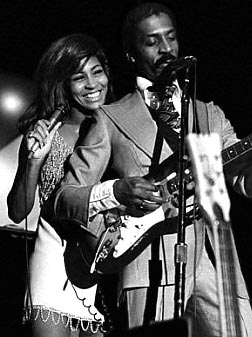
Ike rekindled his relationship with the Bihari Brothers, having left them on good terms nearly a decade earlier. A contract was signed for Ike and Tina to record for Kent Records with the Ikettes appearing on the parent label, Modern. Some of the act's best music came from this association, starting with a fast-moving two minutes of soul, "I Can't Believe What You Say (For Seeing What You Do)," which, unfairly, barely touched down on the chart's surface for a few weeks in October 1964. By this time they had established themselves as a major force onstage; the Ike and Tina Turner Revue featured the Kings of Rhythm at their tightest and Tina at her sassiest with a new lineup of Ikettes that could actually keep up with her exhaustive dance-infused performances. A Warner Bros. album, Live! The Ike and Tina Turner Show, was a precursor to Kent's release of The Ike and Tina Turner Revue Live, highlighted by Tina's extended singing-and-talking take on James Brown's "Please, Please, Please," which simply brought down the house. Top-notch singles came at a steady pace into 1965 including a couple of Modern releases, yet the fast-paced madness of "Good Bye, So Long" (one of their best ever) and the midtempo groove "I Don't Need" barely achieved any sales or airplay. In fact, it was the Ikettes who received more attention during the association with Modern, getting airplay with several singles including the top 40 hit "Peaches 'n' Cream."
In 1965, American International Pictures set out to repeat the success of The T.A.M.I. Show, its blockbuster concert film from the previous year. Directed by Larry Peerce with Phil Spector as musical director, The Big T.N.T. Show was videotaped in November for a 1966 release (transferred to film for showings in theaters as the first had been) and featured a wide range of pop, rock and folk acts (from Joan Baez to The Byrds to Petula Clark to Spector's own Ronettes), saving The Ike and Tina Turner Revue for the closing act. They served up a hard-hitting nine minute finale that included "A Fool in Love," "It's Gonna Work Out Fine" (with Ike on vocals, sounding exactly like he - or Mickey? - had on the original version), a soul-shouting "Please, Please, Please" and house-rocking "Good Bye, So Long." The electricity they displayed impressed Spector, who earmarked them for his next project in what had been a steady stream of successes as a producer over the previous half-decade.
The Jeff Barry-Ellie Greenwich song "River Deep - Mountain High" was sure to be Spector's crowning achievement and the hit that would launch Ike and Tina into the mainstream. There was one catch: Phil wouldn't allow Ike anywhere near the studio while recording, demanding full control of every aspect of his intended masterpiece, and besides, he was maybe just a little afraid of Ike (his intimidating manner a characteristic Spector was perhaps able to see long before Tina). Ike was happy at the opportunity to take advantage of Spector's expertise and status in the industry and had no problem staying away. Actually, even Tina had minimal input at the sessions, mostly just hanging around waiting to be told when to sing while Spector set up the multitude of musicians for his ultimate "Wall of Sound" production.
With his sessions becoming more and more complex the previous couple of years as he raised the bar with each successive Crystals, Ronettes and Righteous Brothers release, was it possible Spector may have gone too far with "River Deep"? In America, yes. To say it met with mixed reviews is putting it kindly. Some thought it was brilliant, but most just heard a muddled, echoed mess. Though it has since come to be regarded as a rock classic, at the time it baffled most radio programmers and only reached number 88 on the charts. A few follow-ups taking a similar approach sank without a trace. Spector's attitudes about the increasingly-psychedelic trend of late-'60s music plunged the depths as well, and his fourth single release by the Turners was also the swan song for the Philles label. The one saving grace was England's acceptance of "River Deep - Mountain High." It went top ten (the first major hit for Ike and Tina in the U.K.) and broke them into the mainstream there in a way Spector had intended it to happen in the U.S.
Ike was cool with it all, simply moving on to a new situation as he had done for many years. After cleverly reworking The Fiestas' 1959 hit "So Fine" with acoustic guitar and horns, releasing it as Ike and Tina and the Ikettes on the Innis label in 1968, he managed to get two record deals going simultaneously in 1969. "I'm Gonna Do All I Can (To Do Right By My Man)" (written by Wayne Carson, best known for his composition "The Letter," a number one hit in '67 for The Box Tops) appeared on Minit Records, but it was at the other label, Blue Thumb, where Tina again hit her stride as a soulful, no-excuses diva with songs like the Otis Redding-Jerry Butler classic "I've Been Loving You Too Long," "The Hunter" (which landed her a second Grammy nomination, for Best R&B Vocal Performance, Female) and the 'thangs and stuff and stuff and thangs' shout of "Bold Soul Sister." On December 6, 1969 they were one of many acts that opened for The Rolling Stones at the Altamont Speedway Festival in California's Alameda County. Well after Ike and Tina's contribution to the concert, the violence that ensued became the unfortunate star of the show, resulting in one death and a notoriety for the event as a low point in rock history.
As the 1970s began, Ike and Tina Turner were about to enjoy their greatest success after signing with Liberty Records (which later merged with United Artists), where they stayed for the rest of their time together. Ike had written the majority of the act's songs since the beginning, but found himself adapting material by other writers more frequently. After lifting a Sly and the Family Stone riff from "Sing a Simple Song" for the opening of "Bold Soul Sister," the Turners gave Sly's "I Want to Take You Higher" the full 'boom-shaka-laka-laka' treatment and hit the national top 40 for the first time in eight years. Then at the start of 1971, Tina's 'nice and easy...nice and rough' rendition of Creedence Clearwater Revival's "Proud Mary" went top ten, their biggest hit ever (and a Grammy winner for Best R&B Performance by a Duo or Group), the unique arrangement frequently imitated ever since. In 1973, Tina recalled her humble beginnings with the rocking "Nutbush City Limits," the last big hit for the husband-and-wife act.
The accounts of Ike's progressively damaging alcohol and drug habits and alleged and/or witnessed abuse of Tina have been well documented. The inevitable breakup occurred in 1976. Ike Turner continued as he had since the start - performing, recording, making things happen, usually taking the money up front. Anna Mae Bullock, now forever Tina Turner, had a harder time adjusting but gradually mounted her enthusiastically-received comeback, reaching heights in the 1980s and '90s beyond anything she had experienced the first time around. Personal difficulties aside, each of them separately has a significance in music history. But when they were together, in the recording studio or on stage with The Ikettes and Kings of Rhythm, it's difficult to find a word or phrase that can describe how truly unique and magical their union was. They were simply fantastic. They were Ike and Tina Turner.
NOTABLE SINGLES:
- Rocket "88" - 1951
by Jackie Brenston and his Delta Cats - Looking For My Baby - 1952
by Bonnie and Ike Turner - The Big Question - 1957
by Ike Turner - Box Top - 1958
as Ike Turner, Carson Oliver and Little Ann - Ho - Ho /
by Icky Renrut - Hey - Hey - 1959
by Icky Renrut - A Fool in Love - 1960
- I Idolize You - 1960
- I'm Jealous - 1961
- It's Gonna Work Out Fine - 1961
- Poor Fool - 1961
- Tra La La La La - 1962
- You Should'a Treated Me Right - 1962
- Crackerjack - 1963
as Ike Turner's Kings of Rhythm - You Can't Miss Nothing That You Never Had - 1964
- Too Many Ties That Bind - 1964
by Tina Turner - A Fool For a Fool - 1964
- I Can't Believe What You Say (For Seeing What You Do) - 1964
- Please, Please, Please - 1965
- Tell Her I'm Not Home - 1965
- Good Bye, So Long - 1965
- I Don't Need - 1965
- River Deep - Mountain High - 1966
- I'll Never Need More Than This - 1967
- So Fine - 1968
as Ike and Tina and the Ikettes - I've Been Loving You Too Long - 1969
- I'm Gonna Do All I Can (To Do Right By My Man) - 1969
- The Hunter - 1969
- I Know /
Bold Soul Sister - 1969 - Come Together - 1970
as Ike and Tina Turner and the Ikettes - I Want to Take You Higher - 1970
as Ike and Tina Turner and the Ikettes - Proud Mary - 1971
- Ooh Poo Pah Doo - 1971
- Nutbush City Limits - 1973


